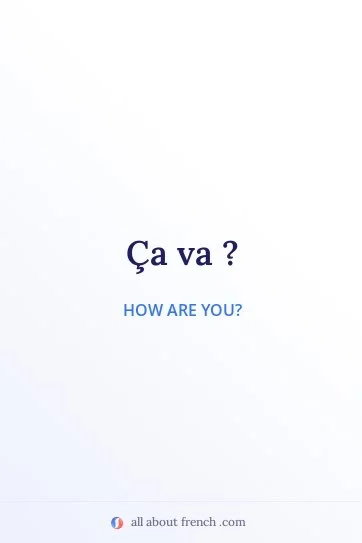
Get prepared to learn everything you want to know about the basic French sentence "Ça va ?". It includes a complete guide of what it is and how to use it in a conversation with an audio example.In addition, we also added useful informations like synonym, dialogue example, slow pronunciation audio and more!
Translation : How are you?
Register : Neutral - Basic
Slow
Normal
IPA : / sa va ? /

It literally means:
One of the most important French expressions you should know! It could be a question and an answer, to be more precise: "Ça va ?" → "How are you?" and "Ça va" → "I'm fine".
Also, this is an informal expression (especially when used as a question), so you should not use it with people you have to show respect. (Elderly people, teachers, etc.)
As you will see in the very complete "Synonyms" section below, many variations exist for both questions and answers. But also regarding formal or informal context.
If you only want to learn the most important ones, it would be: "Ça va ?" (Informal) and "Comment allez-vous ?" (Formal and/or plural) for questions.
And for answers: "Ça va" (I'm fine)(Neutral) and "Ça va, merci" (I'm fine, thanks)(Neutral) and "Ça va, et toi ?" (I'm fine, and you?)(Informal) and finally "Ça va, et vous ?" (I'm fine, and you?)(Formal and/or plural).
Don't forget to check the audio dialogue at the end of this article if you want an authentic example of how French people use it!
A typical use as a question would be: "Salut Alexandre ! Ça va ?" (Hey Alexandre! How are you?). And Alexandre would say "Salut ! Ça va et toi ?" (Hey ! I'm fine and you?)
Also, you could use it not only when talking about how you feel personally, but to show agreement about a proposal / question.
For example, someone asks you: "On part dans 2 heures, tu seras prêt ?" (We are leaving in two hours, will you be ready?) you can answer: "Oui, ça va" (Yes, it will be fine). It's useful because it allows you to avoid a full sentence like "Oui, je serai prêt dans 2 heures" (Yes, I will be ready in two hours)
Finally, you can also use it to say: "Oh ! Ça va !" which means "Hey! That's enough!" if you are angry about something. Don't worry, the voice tone and the context will make it clear for people that you are not saying "Hey! I'm fine!".
People are often confused by "Ça te va bien" which looks very similar but actually means: "That suits you / That looks good on you". So don't be surprised!
Same problem with "Ça va venir" which is super similar but means "It will come / It will happen".
As a question:
As an answer:
More possible answers:
↓ Example in a story with slow audio ↓
Finally, let's see an example in a parallel story with slow audio.
Un invité inattendu
An unexpected guest
10%
The story just started!
Get full access to 365 texts and quizzes, including this one.
 Discover more
Discover more Already a member? Full story and quiz here.
